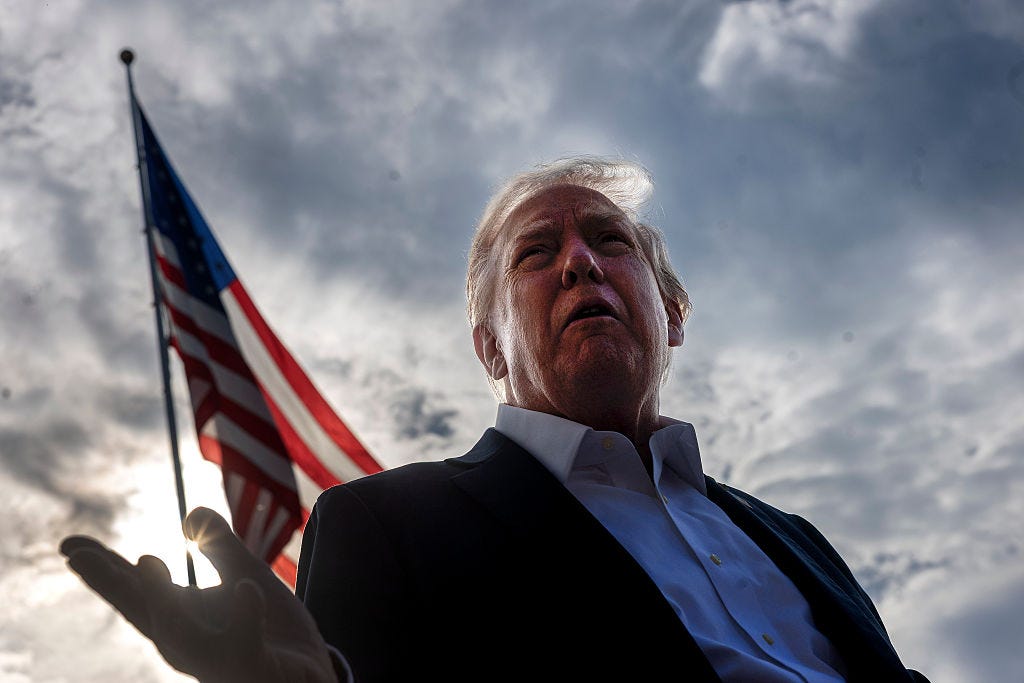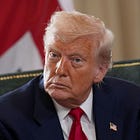Against a Unitary Executive
The Comey indictment is the latest example of Trump's dangerously expansive view of presidential power.

Just so you know: In addition to this column, Francis Fukuyama also writes for the main Persuasion mailing list. That means that if you don’t subscribe to Persuasion, you might miss out on receiving some of his essays!
Click here to manage your account and toggle on the button to receive emails for Persuasion. And as ever, thank you for supporting our community.
One of the main threads running through the first eight months of the second Trump presidency is the question of the limits of executive power—that is, the degree to which Congress and the courts can place limits on the power of the president. This is the issue at the center of Donald Trump’s efforts to have the Justice Department indict former FBI director James Comey. There is a longstanding tradition of prosecutorial independence in the federal justice system, which holds that the Justice Department should exercise independent judgment when filing indictments, applying the law and not following the directives of the political branches. This rule is simply a normative one, however, and it has never been tested to date by such an overt intervention into the judicial process. The existing U.S. attorney for the Eastern District of Virginia, Erik Siebert, was a seasoned prosecutor who believed there was insufficient evidence to indict Comey, and he resigned in the face of President Trump’s demand that his department act. He was replaced by a compliant prosecutor, Lindsey Halligan, who agreed to file the charges just under the statute of limitations deadline.
This is but one example of Trump’s efforts to stretch the powers of the office of the president. Since virtually the day he was inaugurated, he has been firing officials he didn’t like or deemed insufficiently loyal to him, in clear violation of existing laws set by Congress that limit his removal power. There are, for example, any number of officials who can only be fired “for cause,” meaning that the president needs to articulate a clear violation and give the official time to respond. Trump has nonetheless gone ahead and fired inspectors general, members of multimember boards of Federal agencies like the NLRB, MSPB, and FTC, and is seeking the removal of a member of the Federal Reserve Board’s board of governors, Lisa Cook.
“For cause” officials are protected by statutes passed by Congress, and a 1935 Supreme Court decision, Humphrey’s Executor, affirmed the right of Congress to make such rules. But legal conservatives have long opposed that precedent under a doctrine of the “unitary executive,” which holds that the president alone is empowered to make such decisions. The Roberts court has upheld Trump’s right to fire many existing officials, and recently announced that it would be reviewing the underlying precedent by the end of the year. We can assume that the Court’s conservative majority will at that point formally lay Humphrey’s Executor to rest.
It would be useful to lay out the broader arguments for and against the theory of a unitary executive, since this is likely to become the law of the land soon. The first argument in favor is textual: proponents note the language of Article II of the Constitution, which states: “The executive Power shall be vested in a President of the United States.” They argue that these powers are plenary, and cannot be diluted by another branch. A president with plenary powers, they argue, is more accountable, since there is one singular point of responsibility for executive actions. A president can be voted out of office if citizens don’t like his decisions; not so with an executive branch with multiple independent agencies. Distributed executive power may have practical consequences, moreover, if the different parts of the executive don’t agree with one another. In an extreme but illustrative example, one would not want multiple parts of the executive branch debating one another in the event of a nuclear attack, or taking time to come up with a unified response.
I’m not going to debate the originalist issues here, like the implications of the “Decision of 1789.” I’m not a constitutional lawyer, or a lawyer at all; suffice to say that there has been a debate among legal scholars on the Founders’ actual intent. My argument is rather a practical one from the standpoint of good governance, which has to do with the importance of delegation.
All hierarchical organizations, from companies and clubs to armies and the U.S. government, are structured as a series of what economists call principal-agent relationships. The theory is that the principal in any organization has the legitimate authority to make decisions, and that those decisions are implemented by the agents below the principal. The economists who devised this theory argue that organizational dysfunction, manifested in phenomena like corruption, occurs when the agents follow their own narrow interests, rather than obeying the mandates of the principal. The problem then is to align the incentives of the agents with those of the principal. There are many ways of doing this: the principal can write detailed ex ante rules to constrain the agent’s behavior; he/she can demand ex post accountability for agents after the fact; and most importantly, the principal can exercise appointment and removal power over the agents to enforce proper behavior.
Applying this theory to the present case, President Trump as the elected president should have the ability to remove a prosecutor who is not following his dictates.
The problem is that this version of principal-agent theory is woefully inadequate to explain the behavior of most real-world organizations. The Nobel laureate economist Herbert Simon pointed out long ago that in many organizations, authority travels in the opposite direction, from the agents to the principals. The reason for this is that the agents often have much more expertise, skills, and knowledge than the principals, and are in a position to act more swiftly and effectively because they are embedded in the local context.
In other words, all effective organizations have to delegate authority to lower echelons of agents. There are many real-world examples of the importance of delegation, from just-in-time manufacturing to the performance of armies that empower junior officers to take risks and decisions on their own. Indeed, I would say that determining the appropriate degree of delegation is the central issue, both for organizations in general, and for the U.S. government in particular.
We see this most clearly in the case of the U.S. Federal Reserve. The Fed has a mandate to both control inflation, and to do so while maximizing employment. This is an incredibly complex assignment, particularly in a period when underlying forces are pushing inflation higher and employment lower at the same time. The Fed governors and their staff are among the most highly-trained specialists in the world, stocked with PhD economists and people with broad experience in financial markets. They respond to data, and though they make mistakes, it is hard to think of an alternative group to whom such awesome responsibility should be granted.
But the same is true of federal prosecutors. The U.S. attorneys bringing federal charges against wrongdoers are for the most part seasoned professionals who have broad experience in criminal law. They have the judgment to know when not to take on a case, because they do not want to waste court resources or prosecute someone likely to be found innocent.
The U.S. Constitution separates powers among the three branches. But for the last 150 years at least, it has also separated powers within the executive branch. The first U.S. regulatory body, the Interstate Commerce Commission (ICC), was put in place to regulate the revolutionary technology of the late 19th century, the railroads. Congress saw fit to put it under the direction of a multi-member commission that was by statute balanced for partisan representation. Since commissioners in the ICC and other similar bodies like the SEC, FCC or FTC served for staggered fixed terms, their policy orientation did not necessarily change quickly in response to an election which brought a new administration to power.
Generally speaking, these Congressional intrusions into executive authority have had the objective of protecting certain realms of executive decision-making from short-term politicization. That is, we don’t want all government decisions to be immediately accountable to voters, who do not necessarily have a good long-term understanding of their own self-interest. Almost everyone would prefer lower interest rates, but may not understand the downstream inflationary consequences of such a policy.
This is not to say that the status quo of Congressional regulation is always desirable. There are some federal agencies that do need to be made more responsive to the voters’ will, and there has been a long-standing debate among public administration specialists about whether multi-member commissions work as well as those with a single head of agency. But there is no question that the federal government needs to delegate authority to officials with the knowledge, skills, and expertise needed to run a complex modern state, and that Congress ought to be able to play a role in protecting that delegated authority.
Given its behavior up to now, it seems likely that the Supreme Court will soon eliminate most existing constraints on the president’s power to remove officials and control the behavior of the executive branch down to the most minute level. I’ve written before about how this opens the door to the kind of corruption that we saw under the 19th century patronage system. But there is another issue as well that has to do with separation of powers.
Principal-agent theory begins with the premise that the principal is always right, and has the legitimate authority to make decisions. As I argued above, that authority is typically constrained by the need for expertise. But there is another issue as well, which is that the principal may not always be right: though legitimately elected, he may be incompetent, corrupt, ignorant, prejudiced, and hugely self-interested. In such a case, the agents under him may actually serve an important function in not carrying out his mandates, and acting as guardrails against the abuse of power.
What is very strange about the Supreme Court’s 2024 presidential immunity decision was the way that it abstracted from the actual situation the United States faced in the Trump presidency. The conservative justices supporting the decision argued that future presidents needed to be given broad discretionary power to make decisions on behalf of the country as a whole, assuming they would be wise and public spirited. This abstracted from the fact that the ex-president in front of them had gone rogue, seeking to overturn a legitimate election and denigrating the entire electoral process on which American democracy depended. Yes, there may be good future presidents who need to be shielded from unfair accountability, but there are also times when citizens need to be protected from the president himself.
This is the ultimate justification for dividing powers not just between the branches of government, but within the executive branch itself. The modern president is so powerful that he can bend a host of social institutions to his will. No earlier president has ever arbitrarily withheld research money from universities, or threatened law firms that their attorneys would not be allowed inside federal buildings. Needless to say, no prior president has ever openly sought to use the Justice Department to punish his perceived enemies. A unitary executive would give a single individual complete control over these enormous powers, and the president sitting in front of us has openly announced his intention to use those powers for his own purposes.
I hope the Supreme Court is paying attention.
Francis Fukuyama is the Olivier Nomellini Senior Fellow at Stanford University. His latest book is Liberalism and Its Discontents. He is also the author of the “Frankly Fukuyama” column, carried forward from American Purpose, at Persuasion.
Follow Persuasion on X, LinkedIn, and YouTube to keep up with our latest articles, podcasts, and events, as well as updates from excellent writers across our network.
And, to receive pieces like this in your inbox and support our work, subscribe below:





. "The conservative justices supporting the decision argued that future presidents needed to be given broad discretionary power to make decisions on behalf of the country as a whole, assuming they would be wise and public spirited. This abstracted from the fact that the ex-president in front of them had gone rogue, seeking to overturn a legitimate election and denigrating the entire electoral process on which American democracy depended.”
This indeed is the core of the problem. The Founders were justifiably wary of creating an executive with too much power. Indeed, one of the reasons they were willing to create the Executive Branch in the first place was that they knew who the first occupant would be, a man who had already twice proven (at Newburgh and again when he ‘turned in his sword’ to Congress) that he well understood the nature of the struggle in which he had played such a significant part. They hoped (not without some trepidation) that in a ‘republic of virtue’ the citizenry would continue to choose the President wisely.
Two events would get in the way of that hope. The first and most destructive would be the solidification in the 1830’s of our ossified binary political party system in which parry loyalty might, and indeed has come to trump loyalty to the concepts and ideals expressed in the Constitution.
The second is the increasing lack of understanding of those concepts and ideals among far too many American voters. One cannot adequately defend (most crucially in the voting booth) that which one does not understand. The idea that Americans would simply absorb those concepts and ideals by some mysterious form of osmosis, simply by being born and brought up in this country instead of being thoroughly and accurately steeped in them both at home and at school is proving to be folly.
If one needs proof of this, one only has to compare our present presidential campaign events with the Lincoln/Douglas debates in the Illinois US Senate campaign of 1858. People came by their hundreds to listen to an extraordinary series of seven debates which largely but not compeletely focused on the issue of slavery in a supposedly free society. The debates went on for hours and were serious and reasoned and which told a great deal about each man’s character and political beliefs. By comparison, our present presidential debates are fleeting collections of insults and sound bites which tell us almost nothing except both sides’ unwillingness to put forth well-reasoned and substantial sets of beleifs and plans in favor of currying favor with certain elements of one side or the other.
It goes without saying (I think): Trump doesn’t intend on giving up this power.
All the old (good) rules of the republic no longer hold: namely “don’t set a precedent you wouldn’t want reciprocally enacted on you”. That was the Golden Rule of civics.
Our Julius has marched into Rome with his Legions. His Marc Antony is JD Vance. His Praetorian Guard is Pete Hegseth and Kash Patel. A crisis must be created to justify the end of elections - especially if it means putting those no good, rotten, evil, Charlie-Kirk killing, church burning, child shooting, militant trans-loving, ICE attacking, ANTIFA supporting Democrats in office. That is precisely how they will frame it.
With just enough of all that stink in the eyes and ears of normie Americans - already weary of a decade of this run up - his justifications for “cleaning up the filth by any means necessary” likely rings true. And he baits the militant Left to these confrontations - and normie Democrats and their media allies to defend it. They simply can’t NOT take the bait.
Once we admit that this is what’s happening, in front of our very eyes, the true nature of what we’re confronting will brace us harshly.
It’s not that President Trump or JD Vance think this is dangerous to potentially empower a 2028 President Ocasio-Cortez or President Mamdani with such unitary executive powers - which could whipsaw us leftward with similar ferocity - it’s that they know they have three more years to engineer a descent into popular support for the revocation of elections. They have no intention to surrender these gains.
Next up: paramilitary confrontations in Portland and Chicago. It begins.